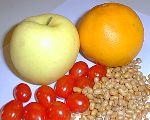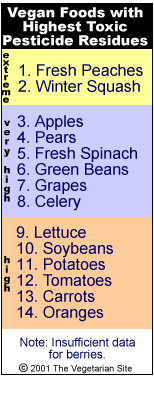
Health Special


Which Vegan Foods Contain the Most Pesticide Residues?
Sticking to a plant-based diet has numerous health advantages, such as decreased risk of heart disease, hypertension, diabetes, osteoporosis, and some forms of cancer. Additionally, we tend to consume less pesticides and pollutants than our meat-eating counterparts because these contaminants become concentrated in animal fats due to months or years of farm feeding. Nevertheless, many conventionally-grown fresh vegan foods do contain substantial pesticide residues.
A recent study by the Consumers Union analyzed years of USDA pesticide data to determine the level of toxic pesticides commonly found in a variety of foods. Huge differences in toxicity levels from crop to crop were found. The two most extreme cases were fresh peaches and winter squash. Both contained up to 100 times the level of toxic pesticide residues found on most conventionally-grown fruits and vegetables. Apples, pears, fresh spinach, green beans, grapes, and celery had levels roughly 10 times lower, but still very high compared with most foods. Faring somewhat better, but still with significant residues, were lettuce, soybeans, potatoes, tomatoes, carrots, and oranges.
U.S. Grown vs. Imported:
Many people have the notion that imported foods from third world countries have higher pesticide levels due to less stringent regulations. However, in most cases the opposite is true! US grown foods generally test highest for pesticide residues.
Processed Foods:
The processing of foods usually reduces nutritional value, but it also tends to decrease the level of toxic pesticide residues. Nevertheless, essentially all health professionals agree that a dietary foundation of whole foods remains far healthier than one based on processed foods. Less frequent consumption of the few vegan foods with extremely high pesticide residues is a good option; buying organically grown foods is a better one. Since chemical pesticides are prohibited on certified organic foods, one can circumvent the whole problem by buying primarily organic.
What About Grains?
Why aren't grains on the high residue list? Don't they contain pesticide residues too? Yes, they do. While wheat didn't make the list, the level of pesticide residues on wheat is about half that of soybeans. But wheat and other grains tend to be consumed in much larger quantities than most foods on the list. So when buying organically grown foods, don't forget to weight the relative amounts of each food you consume!
SOURCES:
Consumers Union of United States, Inc., Do You Know What You're Eating? Feb. 1999.
USDA Pesticide Data Program, 1994-97.
Wild Oats Markets, Inc., Guide to Organic Power, 1998
Copyright © 2001 TheVegetarianSite, All Rights Reserved
